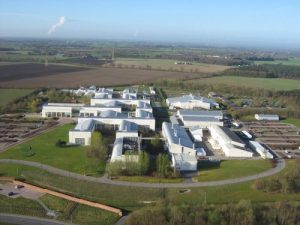Monday Interview: Liz Cashon, Innovation Campus Manager at NAFIC

A Yorkshire science hub is proving its worth for the regional Yorkshire economy, and has ambitious plans to plug the skills gap which is hampering the growth of science and technology firms.
Liz Cashon, Innovation Campus Manager at the National Agri-Food Innovation Campus (NAFIC) at Sand Hutton, near York, said the facility has already enjoyed significant success in terms of expanding its own business tenants.
NAFIC, which sits on an 80-acre site, is a centre for applied scientific research and innovation. It is now home to 16 science-based organisations working at the leading edge of applied sciences, with tenants including major global companies such as Covance and Fera Science, as well as SMEs including skin scientists Labskin.
Cashon was previously Director for Inward Investment at Leeds City Region Local Enterprise Partnership, working to drive investment into Leeds and its wider region.
She joined NAFIC in 2015 and has overall responsibility for marketing the campus and attracting more businesses, while supporting the campus’s existing tenants.
“We have a mix of large and small companies and my role is to help them expand,” she said. “I also have responsibility for how we best use space on site. I look at funding vehicles to support the projects we have here. I’ve retained my links with Leeds City Region LEP and have also made links with North Yorkshire LEP.
“The businesses based at NAFIC carry out work for many other local and regional companies, so the impact we have on the local and regional economy is very important.”
She said NAFIC, which is currently 84% occupied, has 220,000 sq ft of buildings space, as well as outdoor research space. It is part of Capita, which bought the site from the Government in July 2016.
Cashon added: “The site was set up in 1996, initially to house a number of different Government laboratories from across the UK.
“Capita have been true to their word in terms of growing NAFIC as a scientific facility. We’re still undergoing a major investment programme to update our infrastructure. We’ve made a commitment to spend £10m, and this spending has been underway since 2016. At the moment about 850 people work at NAFIC, within 16 different companies.
“Our biggest tenant is Fera Science, who still do a lot of research on behalf of the Government. The work they do is extremely important to protect our populations from any contaminants in food.
“And they also carry out research to defend our native plants from pests and diseases, which is vital for the health of our crops.”
NAFIC has a water testing facility which takes up seven acres. It was funded by Innovate UK and finished late last year. This enables big chemicals companies to have their products tested for any impact on aquatic life.
There are also quarantine glasshouses, a conference centre, a 5,000 sq ft open plan laboratory and high containment laboratories for work on different types of chemistry and biology.
NAFIC hosts drug development programmes and the Government’s Department for Environment, Food and Rural Affairs (DEFRA) has a policy team based at the site.
The facility is home to Public Health England laboratories and the National Bee Unit, which runs bee health initiatives across England and Wales There are a more than a million bees on site.
Cashon said: “We have a really good track record in terms of supporting our smaller businesses, ranging from employers of two to 45 people. A lot of them have doubled in size since they first started out here.
“We’re refurbishing some labs for tenants who are expanding. They are being able to create new jobs, which is excellent.
“Our businesses are affected by the skills gap, so we’ve done a lot of work with local education providers to look at what skills are required. We’re hoping to set up a training academy at NAFIC and have got on board tenants who are interested in the idea.
“One of our expanding businesses is considering making new posts available as apprenticeships in order to grow its talent base. This is instead of taking on graduates, who would be more likely to move on after a year or two.”
For the future, Cashon said she is exploring laboratory sharing opportunities for NAFIC’s smaller companies, which would give them valuable access to expensive equipment which they do not require on a full-time basis.
“This is why I’m keen to build even more links with the region’s businesses and public sector so we can showcase our tenant’s research to them.
“Some of our vacant space comprises offices, not laboratories. So we would like to invite interest from businesses that would see the value in being located close to scientific research companies.”








